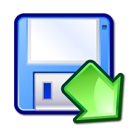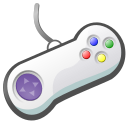This article relies largely or entirely on a single source .(December 2022) |
Nuvola is a free software icon set under the GNU LGPL 2.1 license, created by David Vignoni. [1] Originally created for desktop environments like KDE and GNOME, it is also available in packages for Windows and Mac. [2] The final version, 1.0, contains almost 600 icons. The default set is in the PNG graphics format; an SVG version is also available.
Contents
The application icons, in particular, colourfully represent a wide variety of commonplace and easily recognised objects.




















